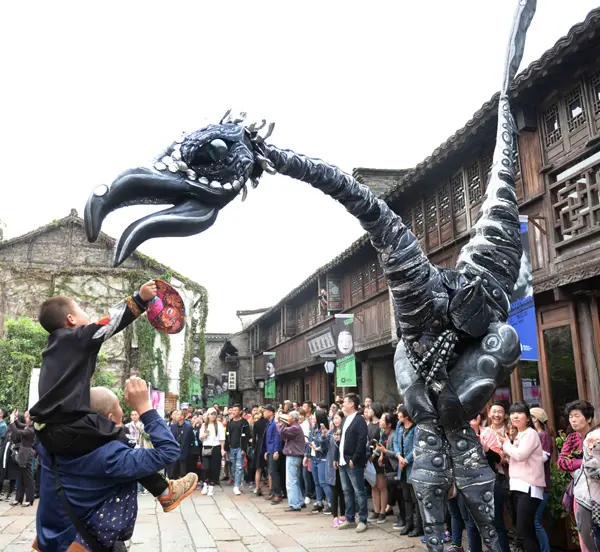A young woman is sprawled against a wooden doorway in Wuzhen's West Scenic Area, surrounded by beat-up old suitcases.
Looking artfully disheveled in a tilted wide-brimmed hat, she stares motionlessly at the ground as a crowd of teenagers rushes to her, cameras at the ready.
Is she a performer or just an ordinary festivalgoer who has failed to find a hotel room? No one is sure, but everyone excitedly snaps photos anyway.
Scenes like this are common at the Wuzhen Theater Festival, a bewildering Mad Hatter's tea party of an event set in a tiny water town in Zhejiang province that has become a word-of-mouth phenomenon in China.
Wuzhen's combination of beautiful scenery, international lineups and pop-up street performances immediately strikes a chord with an emerging generation of young Chinese urbanites, transforming the town almost overnight into one of China's cultural centers.
Nearly 500,000 people streamed into the West Scenic Area last month for the fourth annual festival. Compared to most Western theater events, this audience is astonishingly young.
More than 60 percent of attendees are under age 35, according to the festival's organizers, Culture Wuzhen Co. Most come from the first-tier cities of Beijing, Shanghai, Guangzhou and Shenzhen.
Such is the festival's appeal to young Chinese that Qiu Ling, vice-general manager of Culture Wuzhen Co, claims the company has cut back significantly on advertising during the last two years as online buzz and word-of-mouth has done the job.
So what is behind Wuzhen's extraordinary drawing power?
Backing from such famous stars as director Stan Lai and actor Huang Lei certainly gives Wuzhen credibility, as do high-profile international productions like The Tiger Lillies Perform Hamlet on the lineup each year.
Chuanju Opera from southwestern China is featured at the annual festival. (Photo by Wang Jia / For China Daily)
However, only around one in 10 of the people who come to Wuzhen for the festival actually buy a ticket for a show.
The majority of the young crowd says that they had not come to see any production in particular.
It's really about the atmosphere the festival generates.
Wuzhen has invested huge amounts of money and effort in creating this feel.
Chen Xianghong, director of Culture Wuzhen Co and chairman of the festival's organizing committee, also masterminded the 1 billion yuan ($147 million) development of the West Scenic Area during his term as head of the Wuzhen government.
In many ways, the area and the festival are two parts of the same vision.
The West Scenic Area is often described as a beautifully restored slice of ancient China. But Chen's challenge was to re-create the town's past in a way that appealed to the country's modern youth. In a recent interview, he called it "putting new wine into an old bottle".
The interiors of every building in the West Scenic Area were fitted with modern amenities and free internet. Meanwhile, everything outside the buildings was transformed into a picture-perfect vision of an ancient water town.
Modern buildings in the area were torn down, and Wuzhen rebuilt the rest using traditional materials salvaged from the wreckage of Shanghai's demolished old neighborhoods.
Martin Jacques, lead actor of The Tiger Lillies Perform Hamlet. (Photo by Wang Jia / For China Daily)
A new filtration and purification system keeps the area's canals a perfect shade of jade-green, and modern boats were banned. Even garbage is now transported on traditional-style wooden gondolas.
Finally, the West Scenic Area was isolated from the more ramshackle town outside by high whitewashed walls, enabling Wuzhen to charge a 100-yuan entrance fee, but also heightening the sense visitors have inside the area that they have somehow entered a parallel reality.
The festival's slogan plastered all over the West Scenic Area's entranceway - "beyond the real, all Wuzhen's a stage" - is almost literal.
The festival fits seamlessly into this setting, its 156 daily street performances like small plays within a larger play.
"The festival is not a traditional thing. It is a way of cultivating sentiment," says Qiu.
(China Daily)
 简体中文
简体中文

